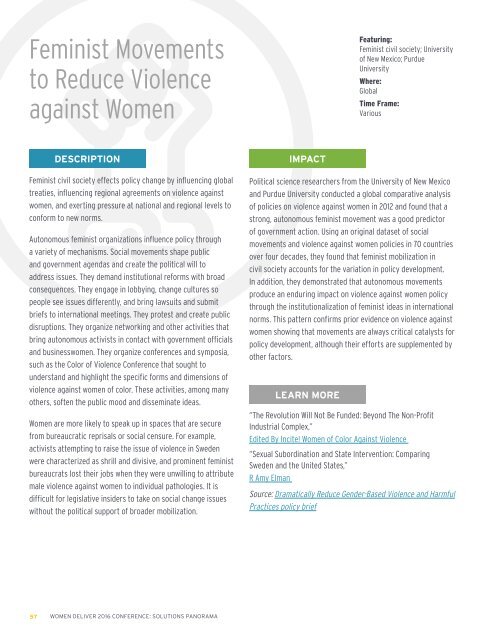Solutions Panorama
A collection of 100 programs, initiatives, and strategies that were shared at the Women Deliver 2016 Conference.
A collection of 100 programs, initiatives, and strategies that were shared at the Women Deliver 2016 Conference.
Create successful ePaper yourself
Turn your PDF publications into a flip-book with our unique Google optimized e-Paper software.
Feminist Movements<br />
to Reduce Violence<br />
against Women<br />
Featuring:<br />
Feminist civil society; University<br />
of New Mexico; Purdue<br />
University<br />
Where:<br />
Global<br />
Time Frame:<br />
Various<br />
DESCRIPTION<br />
Feminist civil society effects policy change by influencing global<br />
treaties, influencing regional agreements on violence against<br />
women, and exerting pressure at national and regional levels to<br />
conform to new norms.<br />
Autonomous feminist organizations influence policy through<br />
a variety of mechanisms. Social movements shape public<br />
and government agendas and create the political will to<br />
address issues. They demand institutional reforms with broad<br />
consequences. They engage in lobbying, change cultures so<br />
people see issues differently, and bring lawsuits and submit<br />
briefs to international meetings. They protest and create public<br />
disruptions. They organize networking and other activities that<br />
bring autonomous activists in contact with government officials<br />
and businesswomen. They organize conferences and symposia,<br />
such as the Color of Violence Conference that sought to<br />
understand and highlight the specific forms and dimensions of<br />
violence against women of color. These activities, among many<br />
others, soften the public mood and disseminate ideas.<br />
Women are more likely to speak up in spaces that are secure<br />
from bureaucratic reprisals or social censure. For example,<br />
activists attempting to raise the issue of violence in Sweden<br />
were characterized as shrill and divisive, and prominent feminist<br />
bureaucrats lost their jobs when they were unwilling to attribute<br />
male violence against women to individual pathologies. It is<br />
difficult for legislative insiders to take on social change issues<br />
without the political support of broader mobilization.<br />
IMPACT<br />
Political science researchers from the University of New Mexico<br />
and Purdue University conducted a global comparative analysis<br />
of policies on violence against women in 2012 and found that a<br />
strong, autonomous feminist movement was a good predictor<br />
of government action. Using an original dataset of social<br />
movements and violence against women policies in 70 countries<br />
over four decades, they found that feminist mobilization in<br />
civil society accounts for the variation in policy development.<br />
In addition, they demonstrated that autonomous movements<br />
produce an enduring impact on violence against women policy<br />
through the institutionalization of feminist ideas in international<br />
norms. This pattern confirms prior evidence on violence against<br />
women showing that movements are always critical catalysts for<br />
policy development, although their efforts are supplemented by<br />
other factors.<br />
LEARN MORE<br />
“The Revolution Will Not Be Funded: Beyond The Non-Profit<br />
Industrial Complex,”<br />
Edited By Incite! Women of Color Against Violence<br />
“Sexual Subordination and State Intervention: Comparing<br />
Sweden and the United States,”<br />
R Amy Elman<br />
Source: Dramatically Reduce Gender-Based Violence and Harmful<br />
Practices policy brief<br />
57<br />
WOMEN DELIVER 2016 CONFERENCE: SOLUTIONS PANORAMA



